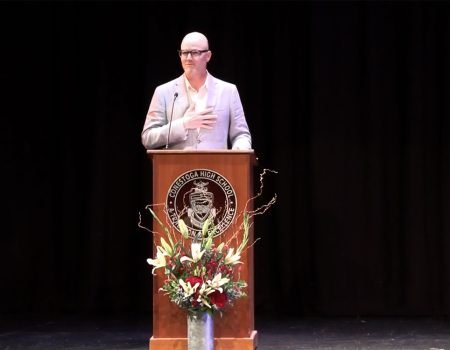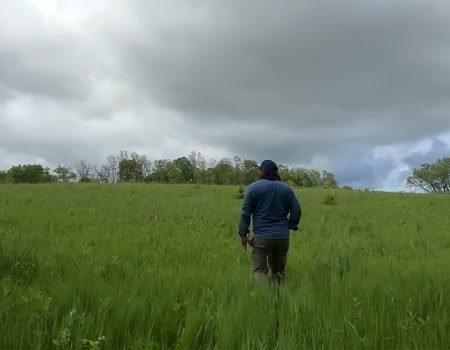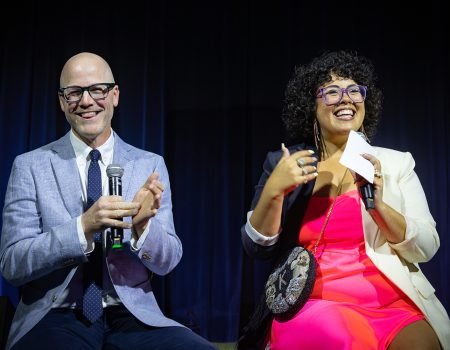A Shot In The Arm
I’m running. It’s 80 degrees on the Gulf Coast. The air is thick and sweet. The palm tree-lined boulevard is wide, hemmed in on the east and west with sleek, South Beach-style condominums. Every few feet, I pass a pair of senior citizens, some walking, some riding bicycles. I wave and smile.
A few miles in, my uncle honks the horn of his white, four-door BMW and waves. He pulls over, smiling beneath his white golf cap. His skin is tan. His eyes are bright. I shake his hand.
“Thanks for everything, Bill.”
Last time I visited him, he insisted I call him Bill. I’m still not used to it.
“Your welcome, pal. Come down anytime.”
“Yunno,” I say, “I just said to Eileen that I’m returning to New York with a lot more perspective than I came with, and I have you to thank for that. So thanks.”
“Anytime, pal.”
He pulls away and heads for his tee time. I resume my run. Our farewell is brief, like many of our conversations. I’m often at a loss for words with him. He he tends to speak in short bursts. I’m pretty sure we understand one another, though.
I decide to run farther than any other morning before, past the high rises I’d previously considered my terminus, then home via the beach. I resolve to push myself just a little bit to get incrimentally stronger.
I’m out of my depths, beyond what I recognize, when I see the street dead end. I turn right on a narrow foot path along the bay, running further still from home. It’s nearly 11 a.m. It’s hot. I’m tired, and parched. Still, I run further and further out of my comfort zone.
Turning southward, I run a long, land-locked, sun-soaked road towards home. The sidewalk is gone. Contruction workers breaking on rooftops stare at me like I’m mad. Vehicles are sealed tight against the hot air. I consider walking a while, but persist, remembering the cool, refreshing ocean which I seek as my goal.
I am descending a white stucco bridge over the sparkling bay when I hear the melody, “Excuse me, son, why do you blame youself?” The latter-half of the phrase — blame youself — is sustained, higher. And just as quickly, as I turn back onto the wide, familia r boulevard towards the beach, the voice in my head finishes, “Are you too close to it to see?”
It’s a song. I think, ‘This is good. Keep singing it. Don’t forget it.’
And as I run further still, closing in on the water fountain at the edge of the public beach, it hits me like a bolt of lightening: That’s The Good Voice! The Advocate! The Fighter! The Man! Listen to him! He’s the one that needs to win!’
You’ll recall me writing about the other voice, the ‘You’re an idot’ voice. Well, this voice is the counterpoint. This is the positive to that negative. The protagonist. And that negative, it occurred to me as I ran on, is The Addict. It’s the part of me that wants to smoke cigarettes, get stoned, and drink beer until I can’t see. It’s the devil on my shoulder.
Well, I found my angel. He’s talkin’. And I’m listenin’.
When I finally make it back, I peel off my clothes and slip beneath the waves. It’s like baptism. I force myself underwater, lingering there in the cool, quiet, blue light, as long as possible. There, beneath the waves, it is as peaceful, as tranquil, as out of body experience I know. I swim and swim and swim, like a kidm like a teenager, out past the buoys, out as far as I can go.
Inside, cleaning myself up for the trip back to New York, I look at myself in the mirror. I am reminded of the first night of my vision quest way back in 1993. I emerged from an hour in a sweat lodge — an igloo-shaped structure covered in animal skins with a deep hole in the middle filled with firey lava rocks — with absolutely every inch of me body and soul, every pore, wide open. Then too, I looked in the mirror and said, “I am a man.”
It’s been a long struggle. It’s difficult to feel like an adult when you work at The MTV, you’re an aspiring rock star, and you live in New York City where material minimalism and renting is the norm. Plus, let’s face it, I was stoned for a good minute there. I wasn’t growing up so fast then.
And it’s difficult to feel like a man when the iconography for man is some kind of intangiable, abstract other. A man is a doctor, or a lawyer, or works on wall street. A man wears a suit. A man own a car, and a house. A man has a wife, and kids.
My father is a man. My uncle is a man. I am not.
Worse, I am none of the anti-establishment versions of man. I am not famous. I am not on the inside. I am not cool. I don’t dress well. I just … am.
Later, waiting in the Ft. Myers airport, I read an article in “New York Magazine” on failure, or the perception thereof. The author, a fiftysomething executive who’d unexpectedly lost his job and was wrestling with the emasculation therein, finds himself sobbing as the credits roll on “Death of a Salesman.” He quote’s the late Arthur Miller’s autobiography:
“Willy Loman was a vessel designed to contain the essence of our human longing to ‘… excel, to win out over anonymity and meaninglessness, to love and be loved, and above all, perhaps, to count.'”
To count. To count.
He concludes:
“All of us, I suspect, imagine that a world exists from which we alone have been excluded; all of us have our noses pressed up against the glass. But if we contemplate our own lives, not the phantom life on the other side, we might find things in them to envy — a family that;s intact, a job we like, excellent health (the thing we take for granted on which all happiness depends). Good fortun eis there, however sporadic, however modest, however difficult to achieve. The trick is to recognize it.”
I am listening more closely now. For the first time in my life, I think I know what I sound like.



